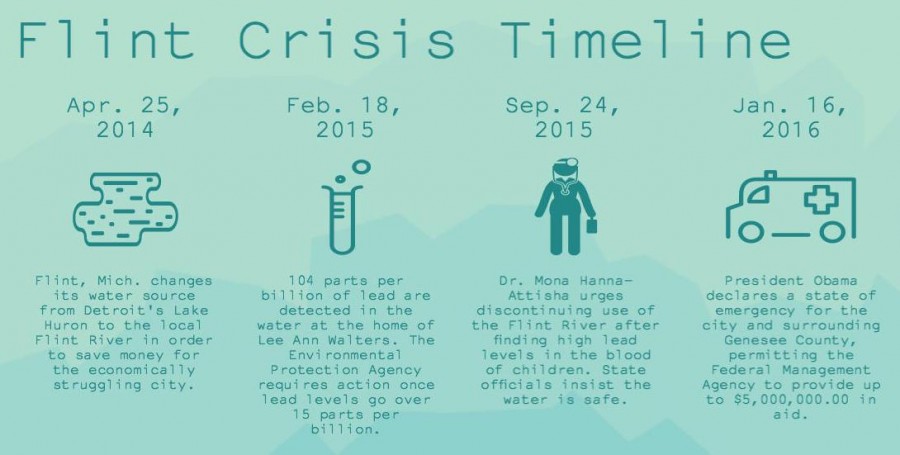Why Coppell citizens should care about the water crisis in Michigan
March 24, 2016
Imagine turning on the tap and having brown water pour out. Imagine having to buy bottled water every time you wanted to take a bath. Imagine being diagnosed with lead poisoning after swimming in your pool.
This is the reality for the people of Flint, Mich., after the city found the water contaminated by toxic lead, which has caused lead poisoning and multiple health problems (rashes, hair loss, developmental problems, irreversible brain damage and possibly several cases of Legionnaire’s disease) to those exposed to the water.
The lead came about as a result of the city changing its water source from Lake Huron to the local Flint River in order to save money. The Flint River has an extremely high amount of chloride ions that corroded the lead pipes, causing the lead to leach into the drinking water.
But even so, the crisis could have been stopped before it even happened. An independent panel placed most of the blame on state officials. A cheap, anti-corrosive agent, that only costs $100 a day, could have easily stopped the lead poisoning. State officials denied the research of concerned scientists and doctors that tested both the water, and the people exposed to it.
But you may be wondering, why should I care? I live on the other side of the country. Lead in the water doesn’t affect me.
And that is the exact problem. Because people do not care unless they are personally affected, water crises like these can continue to happen, all around the country and globe. The wealth of Coppell citizens means that our local officials can always provide clean water for us, but that does not mean it is guaranteed for everyone, especially for those that live in poverty.
“The sole reason that people got hurt was because of inaction,” Coppell High School sophomore and AP Environmental Science student Zakaria Cherif said. “We know that bad things happen as a result [of inaction], but we never actually get up to change these things.”
People should be at least aware of the potential problems that water can have and how local government officials can address those problems. They should be aware of how the water is tested, of what minerals and chemicals are in their water, and where their water actually comes from (which is all available for public access in Coppell’s 2014 Water Quality Report), especially because problems in the water disproportionately affect infants and children.
“A water crisis like the one [in Flint] can happen anywhere, but because of the socioeconomic standings of people in Coppell, it’s less likely to happen here,” AP Environmental Science teacher Holly Anderson said. “We need to be aware of it though, because it could still happen.”
CHS senior Marisa Thakady is currently selling T-shirts in order to support relief efforts for the children of Flint, as they are undergoing medical complications and costs due to long-term lead exposure.
“I believe that Coppell citizens should be concerned about the water crisis because they are more connected than they might think,” Thakady said. “Their neighbors may have family members or friends who are affected by the crisis.”
Thakady’s entire family is from Michigan and is part of a Michigan alumni club, and at least four neighbors on her street are from Michigan. During the Great Recession, General Motors offered buyouts to several of their workers. These workers migrated to Texas because of the booming economy, which accounts for the high numbers of people in the area that are from Michigan.
More than how it may affect friends and family, people should be concerned because the government in Michigan completely failed to provide citizens a basic, humanitarian necessity. As human beings and as part of our civic duty, we should do everything we can to aid the people of Flint in their time of need.
“Denying people of safe water for an extended amount of time is denying people of their Constitutional right to life, liberty, and the pursuit of happiness,” Thakady said. “This isn’t a matter of whether or not these cities are impoverished, it’s simply that these human beings deserve to live a healthy life.”











Jim • Apr 5, 2016 at 11:32 am
A very informative article and absolutely to the point! Great job!
Meha Srivastav • Mar 25, 2016 at 2:15 pm
Wow great article, Jasmine!